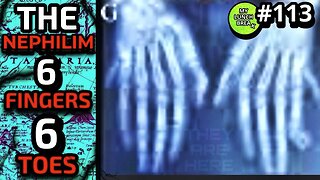Premium Only Content

NT Greek, 1st year, #18: Present Middle/Passive Indicative & Present Deponent Verb, BBG, Bill Mounce
Chapter 18 of William Mounce’s Basics of Biblical Greek covers the New Testament’s Koine Greek present middle/passive indicative and present deponent verb forms. Independent Baptist professor Thomas Ross teaches Bill Mounce's textbook. After chapter 18, one will have completed half of Basics of Biblical Greek! In this chapter, students learn:
• The passive voice in which the subject receives the action of the verb;
• That the present middle/passive is formed by joining the present tense stem, connecting vowel, and primary middle/passive endings;
• That in the present tense, the middle and passive are identical in form;
• That deponent verbs that are middle or passive in form but active in meaning.
A passive verbal construction is one in which the subject receives the action of the verb. In Greek the present passive indicative starts with the present tense stem, adds a connecting vowel—the same connecting vowel that we saw in the present active indicative—and then adds primary passive personal endings.
In English helping verbs are supplied to form the passive, but Greek uses an entirely different set of endings. The present passive indicative forms are λύομαι, λύῃ, λύεται, λυόμεθα, λύεσθε, and λύονται. λύομαι means “I am being loosed” or “I am loosed,” λύῃ means “thou art being loosed” or “thou art loosed,” λύεται means “he, she, or it is being loosed” or “is loosed,” λυόμεθα means “we are being loosed” or “we are loosed,” λύεσθε means “ye are being loosed” or “ye are loosed,” and λύονται means “they are being loosed” or “they are loosed.”
Students learn:
1.) The true personal passive endings: μαι, σαι, ται, μεθα, σθε, and νται
2.) The endings that result when combined with the connecting vowel: ομαι, ῃ, εται, ομεθα, εσθε, and ονται
3.) The true endings with the verb: λύομαι, λύῃ, λύεται, λυόμεθα, λύεσθε, and λύονται
The subject does the action of an active verb, and it receives the action of a passive verb. English forms the passive through the use of helping verbs, and the time of the verbal construction is determined by the helping verb and not the main verb. The Greek present passive is formed by using the primary tense stem, connecting vowel, and the primary passive personal endings. Passive verbs are often followed by some “by” construction that indicates who or what does the action of the verb.
A deponent verb is a verb that is middle or passive in form, but active in meaning. How can you know if a verb is deponent? Lat the lexical form. If the lexical form ends in ομαι, then the verb is deponent. Note that Accordance Bible Software classifies deponent forms as middle, while Logos in its parsing says “either middle or passive.”
In any given tense, a verb will either be deponent or regular. While in a single tense a verb will always be either regular or deponent, that is not always the case for all tenses.
How do you form a present middle indicative? You start with the present tense stem, add a connecting vowel, and then, since the middle form is identical to the passive in the present tense, you add the primary passive or primary middle/passive personal endings. In other words, you do exactly the same thing to form a present middle indicative that you do to form a present passive indicative. Thus, the forms of the present middle indicative of ἔρχομαι are ἔρχομαι, ἔρχῃ, ἔρχεται, ἐρχόμεθα, ἔρχεσθε, and ἔρχονται.
All middles before BBG chapter 25 are deponent middles, so they all have active meanings, not true middle meanings. About 75% of all the middles in the NT are deponent, and so they will be active in translation.
Contract verbs are the final issue in this chapter. The forms for alpha, eta, and omicron contract verbs are:
ἀγαπῶμαι
ἀγαπᾷ
ἀγαπᾶται
ἀγαπώμεθα
ἀγαπᾶσθε
ἀγαπῶνται
ποιοῦμαι
ποιῇ
ποιεῖται
ποιούμεθα
ποιεῖσθε
ποιοῦνται
πληροῦμαι
πληροῖ
πληροῦται
πληρούμεθα
πληροῦσθε
πληροῦνται
After learning the vocabulary from this chapter, you will know slightly over 70% of all the word occurrences in the NT. In relation to the vocabulary word ὅστις, ἥτις, ὅτι, note the chart for the forms of this word on BBG pg. 349. For ὅτι [TR has ὅ τι with a space]; for οὗτινος [TR gen. sing, ὅτου]. Many of the forms listed by Mounce do not occur in the Textus Receptus.
The days of the week in Greek are all feminine because they intrinsically modify ἡμέρα. They are:
• κυριακῇ (Revelation 1:10)
• δευτέρα
• τρίτη
• τετάρτη
• πέμπτη (Didache 8:1)
• παρασκευή (John 19:42; Martyrdom of Polycarp 7:1).
• τό σάββατον the Sabbath. Note that in none of its 68 instances in the NT is the Sabbath ever a reference to a yearly festival; it is always a reference to Saturday, the weekly festival.
Therefore, in verses such Colossians 2:16, reference is made to the yearly, the monthly, and the weekly festivals, all of which are shadows done away in Christ.
-
 3:10:03
3:10:03
Barry Cunningham
16 hours agoTRUMP WEEKEND BRIEFING! MORE WINNING...MORE LEFTIES LOSING IT!
75.9K40 -
 2:20:09
2:20:09
Tundra Tactical
16 hours ago $3.09 earnedIs Trumps Executive Order A Second Amendment Wishlist???: The Worlds Okayest Gun Live Stream
51.2K2 -
 2:33:51
2:33:51
John Crump Live
21 hours ago $28.59 earnedSaturday Night Main Event!
150K14 -
 13:57
13:57
TimcastIRL
1 day agoTrump NUKES IRS After DOGE Investigation, OVER 9000 Employees To Be FIRED
154K189 -
 13:35
13:35
Russell Brand
19 hours agoPFIZER JUST MADE THEIR NEXT MOVE AND EXPERTS ARE TERRIFIED
168K341 -
 1:15:57
1:15:57
Victor Davis Hanson Show
1 day agoOver Here, Over There: the Russo-Japanese War and Trumpian Peace Policy
87.2K37 -
 23:55
23:55
MYLUNCHBREAK CHANNEL PAGE
1 day agoThe Nephilim Are Here
104K103 -
 1:00:58
1:00:58
Break The Cycle w/ Joshua Smith
16 hours ago $2.21 earnedBreak The Cycle Ep. 247: Funny Guys w/ Robbie "The Fire" Bernstein
35.6K1 -
 41:26
41:26
TheTapeLibrary
1 day ago $10.73 earnedThe Disturbing Horrors of the Trans-Allegheny Lunatic Asylum
66.4K13 -
 10:07
10:07
Tundra Tactical
17 hours ago $7.64 earnedTRUMP'S HUGE GUN RIGHTS MOVE!
46.4K10